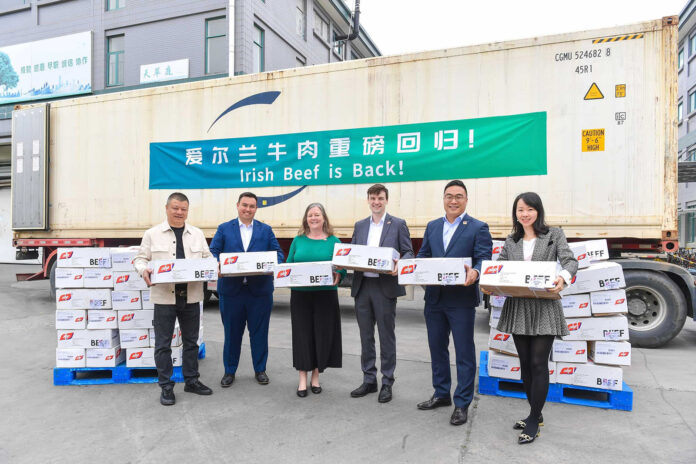
Irish beef is back in the Chinese market with the first shipment from Ireland arriving into Shanghai on Sunday.
In January the Department of Agriculture, Food and the Marine confirmed the resumption of Irish beef exports to China following a suspension in May 2020 due to an isolated case of atypical BSE.
Beef access was granted to Ireland in 2018, and by 2019 exports had reached almost €40 million, the last full year of trade. In 2020, beef exports were on track to far exceed 2019 levels, with January to May figures having more than doubled compared to the same period in the previous year.
Sunday saw the first container of Irish beef (supplied by ABP) in 2023 arrive into the port of Shanghai. The lifting of the suspension by the General Administration of Customs of China (GACC) has paved the way for an extensive relaunch and promotional campaign by Bord Bia’s Shanghai office for the coming months.
Speaking from Shanghai, Bord Bia’s China Manager, Conor O’Sullivan, said: “We are delighted to welcome Irish beef back into the Chinese market after a suspension of almost three years. Bord Bia is now engaged in an Irish beef relaunch campaign focusing on trade seminars, chef demonstrations, and media engagement. Over the next month, we will be exhibiting at two major international meat trade shows in China – the China International Meat Industry Exhibition (CIMIE) and SIAL China in May– to showcase Irish beef to Chinese buyers.
“After first entering in 2018, Ireland quickly established a reputation as a leading supplier of grass-fed beef in China. We had a lot of success building market share into higher value foodservice and retail channels. We are eager to regain that significant momentum in China.”
BEEF CONSUMPTION IN CHINA
Foodservice remains the primary channel for beef consumption in China, with frozen beef making up an estimated 60%1 of the total consumption. Bord Bia’s Insight and Planning Specialist for Asia, Evelyn Chiang, says a key trend emerging in the foodservice sector is the preference for chains of restaurants to use imported beef.
“Chinese consumers highly value the quality of their food ingredients and the quality of imported beef is highly regarded, presenting a significant opportunity for Irish beef suppliers. Hot-pot restaurants, steakhouses and barbecue restaurants are all seeking high-quality and reliable imported beef, which is great news for Irish companies in the market,” she said.
“This rise of e-commerce and specialised stores is part of the changing consumption patterns in China’s expanding middle class, which puts a premium on health and taste, she said. “This trend is an excellent fit for Ireland’s grass-fed, sustainably produced beef.”
ONGOING CAMPAIGNING
In December 2022, Bord Bia launched a three-year €1.3 million EU beef and lamb promotion to promote the safety, sustainability, and natural values of beef and lamb to Chinese consumers and customers. This campaign, which includes a Pork and Beef Chef Masterclass in Beijing and a European Meat Trade Seminar in Shanghai in May, will intensify in the months ahead and run until May 2024, tying in with the Department of Agriculture Food and the Marine’s ministerial trade mission to China in May.
This month, Bord Bia welcomes 15 Chinese government representatives to Ireland for a comprehensive two-week knowledge transfer programme on an itinerary involving visits to Irish farms and processors as part of the EU Pork and Poultry campaign. This campaign is running concurrently with the EU Beef and Lamb campaign in China.







